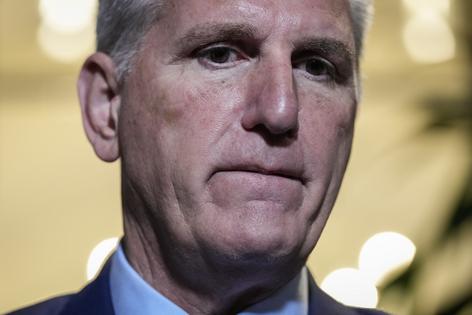Kevin McCarthy's leadership is an open question as budget shutdown looms and GOP infighting takes center stage
Published in Political News
What do you get when you combine a tiny legislative majority, a former president itching for influence and a rogue group of lawmakers who like making headlines? House Speaker Kevin McCarthy’s hellish life these days. The pressure has been fierce on McCarthy to fashion an agreement with his caucus to stave off a government shutdown. But every day seems to bring another set of demands from hardline House Freedom Caucus members, who seem unwilling to accept a deal – and willing to risk a shutdown to make their points. The Conversation spoke with congressional expert Charles R. Hunt, a political scientist at Boise State University, about the current political standoff, its roots and what it means for people across the country.
The 2022 elections were much closer than Republicans thought they were going to be. And there is a big difference between having a 20-vote margin and the nine-vote margin that McCarthy has now. A big part of the speaker’s job is to whip votes and to keep people in line, mainly in the speaker’s own party. And that becomes much more difficult when you have such a small margin.
McCarthy’s job is made even more difficult by the extremist wing of the Republican Party. Though the extremists have been around for years, starting with the Tea Party during the Obama Administration, they have changed over the years. Back then, they were hyper-focused on true ideological battles such as small government and spending cuts.
It’s not that the current crop of lawmakers in the Freedom Caucus don’t want those things. But more and more, it’s not so much issue positions, but rather personality and culture that are driving this faction of Republicans – as well as the voters that they need to win.
They are much more interested in impeaching President Joe Biden or investigating his son, Hunter, than getting a vote on, say, immigration reform.
The fact that Donald Trump continues to have inordinate influence tells us a lot about what being conservative means right now; more than ever, it is not so much a statement of policy positions as it is a statement on cultural identity.
Trump is a good example. He is not as traditionally conservative on the issues as some of his GOP opponents in the presidential race. But he embodies the conservative wing of the party among both the voters and members of Congress because of his cultural identity and his insistence on taking the anti-establishment road every time it is available to him, even if it has nothing to do with policy positions.
It seems like no one in this far-right faction can define exactly what they want because striking a deal with McCarthy on the budget is not their endgame. Their endgame seems to be giving the congressional equivalent of the middle finger to the establishment. That was the entire basis for the first Trump candidacy in 2016. And some congressional Republicans are mimicking that because that is what their voters want.
This is what’s really interesting about Congress. There’s a reasonable argument to be made that a member of Congress’ job is not necessarily to represent the broader public interest but to represent the interests of their constituents in their districts. And whether you like it or not, that is what these lawmakers see themselves as doing at this moment.
Compare the far-right wing to the more moderate Republicans in districts who are reluctant to go down the impeachment route and want to strike a deal with McCarthy and the Democrats to pass a budget. But the GOP far right doesn’t appear to care about passing any significant legislation.
Most of the time, speakership battles are not contentious. And there’s always a rumbling of some kind or another from an outsider wing of the majority party. But the problem now is that, in a new rule since McCarthy became speaker, one member can bring a motion to vacate, which forces a vote on whether the speaker keeps their job. That does not mean that McCarthy automatically loses the speakership – it would still require votes by the whole House.
And it seems like the Democrats’ strategy here is to just watch the GOP self-destruct. So a lot of this is what we call messaging votes. We got a lot of this in the 2010s with the Republican House voting over and over again to repeal Obamacare – even though President Barack Obama would obviously never sign that bill.
But the problem with McCarthy is that his majority is so slim and this faction is so extreme that it’s driving many of the moderate Republicans crazy. The moderates want to just get through the day, and the Freedom Caucus isn’t letting them.
A government shutdown is not just this kind of amorphous thing that only Washington cares about. It has huge implications for people’s everyday lives, especially if it drags on for weeks.
A shutdown means slower mailing of Social Security checks, and closed national parks. A shutdown has automatic economic consequences on the stock market and in regular people’s paychecks.
We can talk about the 2024 presidential election and Trump’s indictments all we want. But budget negotiations matter now.
This article is republished from The Conversation, an independent nonprofit news site dedicated to sharing ideas from academic experts. Like this article? Subscribe to our weekly newsletter.
Read more:
Kevin McCarthy voted Speaker of the House on 15th vote — we had some questions about the chaotic week in Congress and got a few answers
Trump backers are lining up to block Republican frontrunner for new House speaker
Charles R. Hunt does not work for, consult, own shares in or receive funding from any company or organization that would benefit from this article, and has disclosed no relevant affiliations beyond their academic appointment.























































Comments